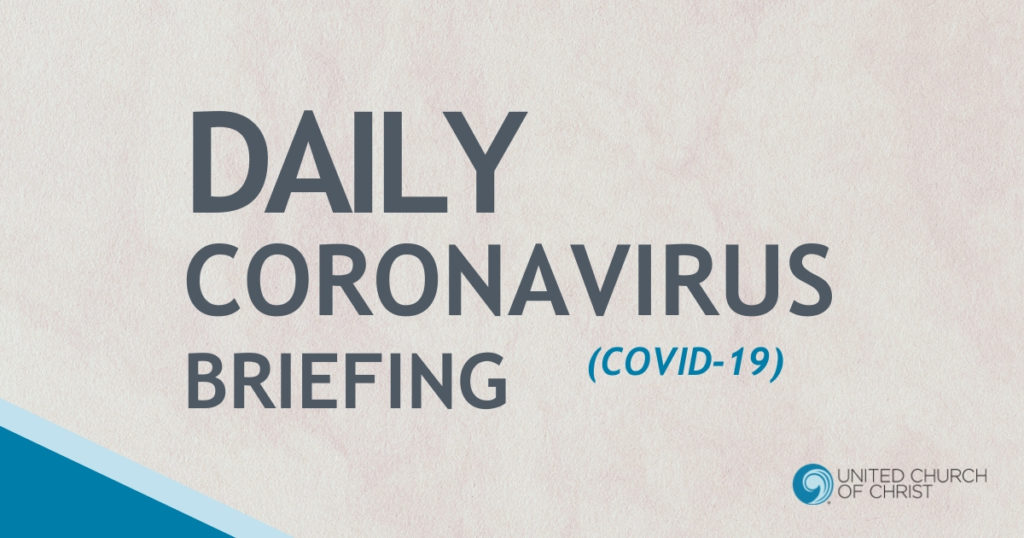COVID-19 recovery not as simple as once thought
United Church of Christ – Wider Church Ministries
Humanitarian Development Team
Coronavirus (COVID-19) Daily Briefing
Barbara T. Baylor, MPH – Temporary Health Liaison
COVID-19 recovery might not be as simple as once thought
Now that doctors worldwide have several months of experience treating patients with COVID-19, patterns are emerging giving clues about how the illness manifests itself. Doctors are seeing more patients with rapid, unexpected development of severe symptoms that have returned (and are worse), lasting for weeks with seemingly no end in sight.
Felicity Callard, a geographer at the University of Glasgow, who has COVID-19 and is on day 77 of living with the virus, shares a chilling notion. She says people think that ”because most cases are mild and brief, it bolsters the belief that only the sick and elderly need to isolate themselves, and that everyone else can get infected and be done with it. She believes that it establishes a framework in which ‘not hiding’ from the disease looks like a manageable and sensible undertaking.”
“It feels like no one understands,” said an educator in DC on day 78. “I don’t think people are aware of the middle ground, where it knocks you off your feet for weeks, and you neither die nor have a mild case.”
Vonny LeClerc, a Glascow-based journalist shared her coronavirus journey, in The Atlantic. She wrote this about her day 80:
“On March 16 I arrived home feeling shivery and flushed. Over the next few days, I developed a cough, chest pains, aching joints, and a prickling sensation on my skin. After a week of bed rest, I started improving. But on day 12, every old symptom returned, amplified and with reinforcements:
“I spiked an intermittent fever, lost sense of taste and smell, and struggled to breathe. On day 66, I was still experiencing waves of symptoms. I was having trouble standing up in the shower without feeling fatigued. Going to the supermarket was so exhausting that I stayed in bed for days afterwards.” She explained, ‘It’s like nothing I’ve ever experienced before.”
More than 230,000 people in the United States have recovered from COVID-19, according to Johns Hopkins University. The Centers for Disease Control and Prevention consider a person recovered if three days have passed since a fever broke without the assistance of medication, and if respiratory symptoms, such as cough or shortness of breath, have improved. Negative tests can also signal recovery, but tests can be inaccurate.
The World Health Organization has said that about 80 percent of COVID-19 infections are mild or asymptomatic and the median time from illness onset to recovery is around two weeks for mild cases, and between three to six weeks for those with severe or critical disease. But many with “mild” disease have reported symptoms lasting far longer than 14 days – some for at least one to three months.
It appears that a number of patients start to feel better before their health quickly deteriorates. Experts say trouble breathing is a sign that COVID-19 may be wreaking havoc in the body, and usually requires an emergency response including possible hospitalization.
These lingering and long-term symptoms may wax and wane for 30 days or more and may include: * muscle aches * rashes * extreme fatigue and exhaustion * “brain fogs” and concentration challenges * short-term memory loss and hallucinations * trouble sleeping * low-grade fevers * night sweats * numbness in limbs *shortness of breath * headaches.
Callard also noted that other recovered COVID-19 patients have faced disbelief from friends and medical professionals because they don’t conform to the “typical” profile of the disease. People have questioned how they could possibly be so sick for so long, or whether they’re just stressed or anxious.
Several COVID-19 survivors and doctors expressed long-term effects:
“It’s really scary, because you are just kind of left at home by yourself essentially trying to treat it.” – Day 60
Joseph Conigliaro, MD, Chief of General Internal Medicine at Northwell Health in New York, has seen a variety of lingering effects on the kidneys, gastrointestinal tract, and neurological system.
Findings from a nationwide study of neurological complications associated with COVID-19 at the University of Liverpool have raised concerns about possible neurological or psychiatric complications including stroke and psychosis. The study, published in the journal Lancet Psychiatry, is an important snapshot of potential complications.
Pulmonologists have agreed that “it appears that patients tend to have symptoms for about a week before either getting better or getting really sick and that there seems to be a period of time where the body is trying to sort out whether it can beat this or not.”
The biggest concern by recovered COVID-19 patients reporting these lingering and long-lasting symptoms is that they are left alone.
COVID-19 patients who are not sick enough to be hospitalized have little guidance on how to recover. There is no specific drug or treatment, other than rest, fluids and fever-reducing medicine such as Tylenol. But because the virus can smolder in the body for days or weeks before potentially worsening, some physicians are increasing their vigilance for those recovering at home alone with more telephone calls, check-ins and telling patients what to look out for.
COVID-19 Daily Briefing Archives
See Also: Racial and Ethnic Disparities – Information for Action Archive
Related News
Growing Weary
In December 1964 during a speech in Harlem, Fannie Lou Hamer declared: “And you can always...
Read MorePlanning for Earth Month: Resources for Congregations
April is Earth Month, and for congregations, it can be a great time to further discern how...
Read MoreBodily Autonomy Means Every-BODY
Advocacy and Action for Women's and Gender Justice Local events stir thoughts and...
Read More


